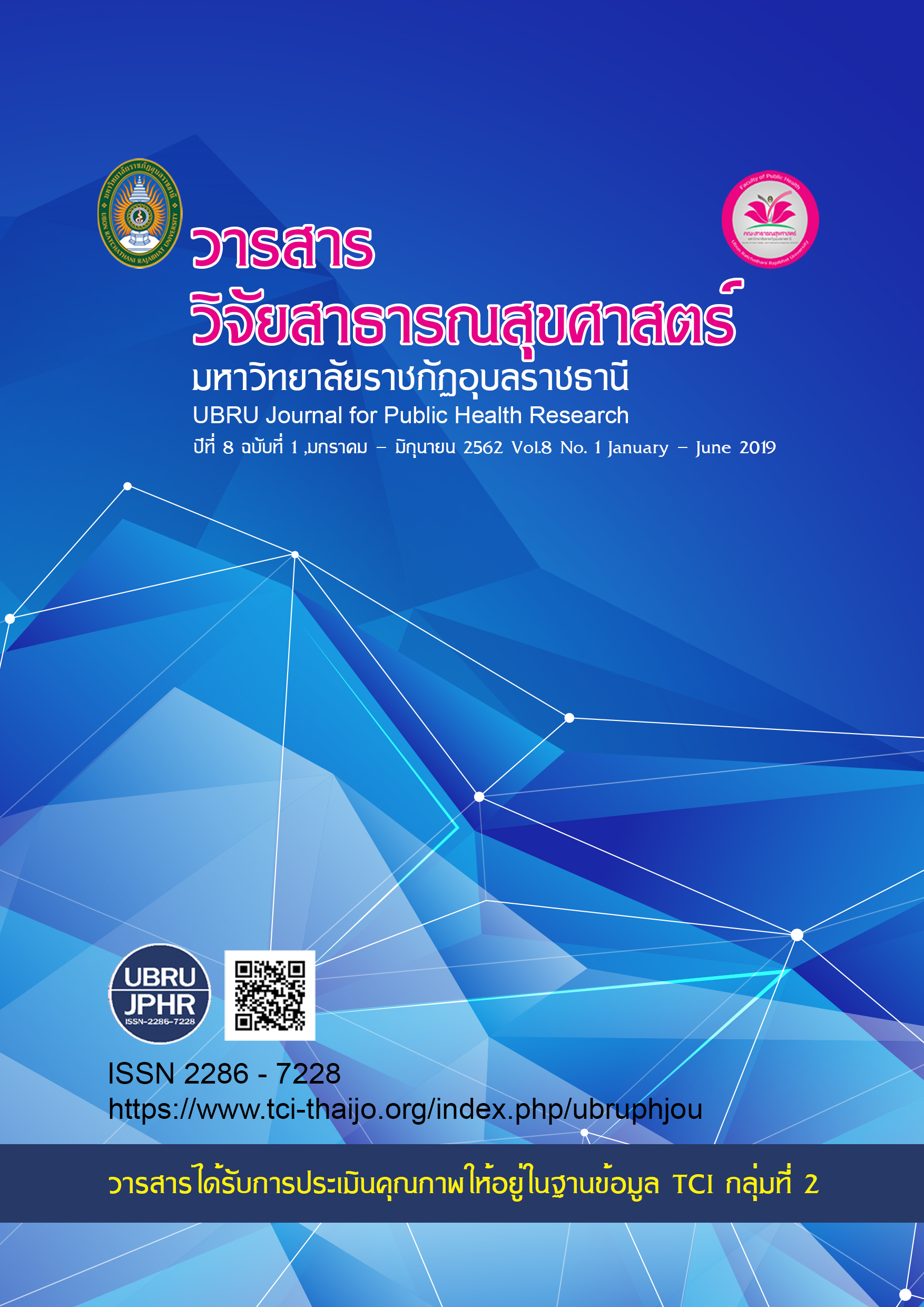ผลของการใช้โปรแกรมส่งเสริมสุขภาวะตามแนววิถีพุทธแก่นักศึกษา คณะสาธารณสุขศาสตร์ มหาวิทยาลัยราชภัฏอุบลราชธานี
คำสำคัญ:
โปรแกรมส่งเสริมสุขภาวะ, วิถีพุทธ, นักศึกษาบทคัดย่อ
การวิจัยนี้เป็นการวิจัยแบบกึ่งทดลอง (Quasi-experimental research) มีวัตถุประสงค์เพื่อ 1) ทดลองใช้โปรแกรมการส่งเสริมสุขภาวะวิถีพุทธแก่นักศึกษา 2) ศึกษาผลที่เกิดกับนักศึกษาภายหลังใช้โปรแกรมการส่งเสริมสุขภาวะวิถีพุทธ ตัวแปรอิสระ คือ โปรแกรมการส่งเสริมสุขภาวะวิถีพุทธ ตัวแปรตามคือ ระดับสติของนักศึกษา ทำการศึกษาในช่วงระหว่าง 19-21 กรกฎาคม พ.ศ.2560เครื่องมือที่ใช้ในการเก็บรวบรวมข้อมูล คือ แบบวัดระดับสติ และแบบสนทนากลุ่ม ประชากร คือ นักศึกษาคณะสาธารณสุขศาสตร์ มหาวิทยาลัยราชภัฏอุบลราชธานี จำนวน 794 คน กลุ่มตัวอย่าง คือ นักศึกษาคณะสาธารณสุขศาสตร์ ประจำปีการศึกษา 2560 จำนวน 200 คน ได้มาโดยการคัดเลือกแบบเฉพาะเจาะจง (Specific sampling) จากผู้ที่มีความสมัครใจเข้าร่วมโปรแกรมและมีสุขภาพแข็งแรง แบ่งกลุ่มตัวอย่างเป็น 2 กลุ่ม โดยจับคู่ให้มีคุณสมบัติใกล้เคียงกันในเรื่อง ประสบการณ์การฝึกสมาธิ และภูมิลำเนา แล้วจับสลากเข้ากลุ่มตัวอย่าง 100 คนแรกเป็นกลุ่มควบคุม ซึ่งใช้ชีวิตตามปกติของนักศึกษา ส่วนกลุ่มตัวอย่าง 100 คนหลังเป็นกลุ่มทดลอง ออกแบบให้เข้าสู่โปรแกรมการส่งเสริมสุขภาวะตามแนววิถีพุทธและพักอาศัยอยู่ในศาลาปฏิบัติธรรมเป็น เวลา 3 วัน 2 คืน สถิติที่ใช้ในการวิเคราะห์ข้อมูล ได้แก่ mean, standard deviation, paired simple t-test และการสนทนากลุ่ม (Focus group)
ผลการวิจัย พบว่า (1) กลุ่มทดลองใช้โปรแกรมส่งเสริมสุขภาวะตามแนววิถีพุทธพบว่า นักศึกษามีระดับสติหลังการทดลอง ในกลุ่มทดลองสูงกว่ากลุ่มควบคุมอย่างมีนัยสำคัญทางสถิติ(p<0.001) (2) จากการสนทนากลุ่ม (Focus group) กลุ่มทดลองใช้โปรแกรมส่งเสริมสุขภาวะวิถีพุทธ พบว่า นักศึกษา 1) มีสติเป็นปัจจุบันมากขึ้นกว่าเดิม 2) ความจำและการคิดวิเคราะห์ดีขึ้น 3) มีความรู้สึกสงบมากขึ้น 4) มีความสุขุมรอบคอบมากขึ้น 5) มีระเบียบวินัยมากขึ้น 6) มีวิริยะอุตสาหะในการทำงานมากขึ้น 7) รู้จักเสียสละมากขึ้น 8) มีเมตตามากขึ้น และ 9) รู้จักการให้อภัย
จากผลการวิจัยสรุปได้ว่า การใช้โปรแกรมการส่งเสริมสุขภาวะวิถีพุทธทำให้ระดับสติของนักศึกษาเพิ่มมากขึ้น ทำให้นักศึกษาได้รับการพัฒนาด้านคุณธรรม จริยธรรม และการมีจิตอาสา คุณสมบัติเหล่านี้จะส่งผลดีต่อความก้าวหน้าในชีวิตต่อไป ข้อเสนอแนะจากการวิจัย มีดังนี้ 1) ควรแบ่งทีมนักศึกษาออกเป็น 2 ทีม แยกฝึกเป็น 2 ช่วง เพื่อสะดวกในการใช้อาคารสถานที่
2) ควรจัดสรรเวลาในการใช้โปรแกรมมากกว่าเดิม 3) ควรสร้างวัฒนธรรมองค์กรส่งเสริมสุขภาวะวิถีพุทธ และศาสนาอื่นที่นักศึกษานับถือ 4) ควรพัฒนาแนวคิดของนักศึกษาด้านศาสนาให้เห็นเป็นเรื่องทันยุคทันสมัย
เอกสารอ้างอิง
เก้า จันทรเกษม. (2551). ความสัมพันธ์ระหว่างการจัดสภาพสถานศึกษาตามแนววิธีพุทธกับพฤติกรรมของนักศึกษาพยาบาลตามแนววิถีพุทธ. วิทยาลัยพยาบาลบรมราชชนนี พระพุทธบาท สถาบันพระบรมราชชนก สำนักงานปลัดกระทรวงสาธารณสุขกระทรวงสาธารณสุข.
ทัสนี พูลผล .(2558). มงคลชีวิต 38 ประการ. นนทบุรี: บริษัท วัน ซิกซ์ตี้ เอท จำกัด.
พุทธทาสภิกขุ, ปัญญา นันทภิกขุ. (2541). วิสัชนาธรรมหลวง. กรุงเทพฯ: ธรรมสภา.
พุทธทาสภิกขุ. (2542). การปฏิบัติวิปัสสนาอิริยบถ เดิน ศิลปะแห่งการครองชีวิตของมนุษย์. กรุงเทพฯ: ธรรมสภา.
พุทธทาสภิกขุ. (2550). โพธิปักขิยธรรมประยุกต์. กรุงเทพฯ: ธรรมสภา.
พระราชสิทธิมุนี. (2561). กระบวนปลูกฝังค่านิยมการบริโภคด้วยพุทธิปัญญาสำหรับวัยรุ่น. ศูนย์ปฏิบัติธรรม สถาบันวิปัสสนาธุระ มหาวิทยาลัยจุฬาลงกรณราชวิทยาลัย.
อารี นุ้ยบ้านด่าน. (2555). ผลของการฝึกปฏิบัติสมาธิแบบวิปัสสนากรรมฐานต่อระดับความเครียดและระดับสติของนักศึกษาพยาบาล มหาวิทยาลัยสงขลานครินทร์. คณะพยาบาลศาสตร์ มหาวิทยาลัยสงขลานครินทร์.
ดาวน์โหลด
เผยแพร่แล้ว
รูปแบบการอ้างอิง
ฉบับ
ประเภทบทความ
สัญญาอนุญาต
เนื้อหาและข้อมูลในบทความที่ลงตีพิมพ์ในวารสารวารสารวิจัยสาธารณสุขศาสตร์ มหาวิทยาลัยราชภัฏอุบลราชธานี ถือเป็นข้อคิดเห็นและความรับผิดชอบของผู้เขียนบทความโดยตรงซึ่งกองบรรณาธิการวารสาร ไม่จำเป็นต้องเห็นด้วย หรือร่วมรับผิดชอบใดๆ
บทความ ข้อมูล เนื้อหา รูปภาพ ฯลฯ ที่ได้รับการตีพิมพ์ในวารสารนี้ ถือเป็นลิขสิทธิ์ของวารสารฯ หากบุคคลหรือหน่วยงานใดต้องการนำทั้งหมดหรือส่วนหนึ่งส่วนใดไปเผยแพร่ต่อหรือเพื่อกระทำการใดๆ จะต้องได้รับอนุญาตเป็นลายลักอักษรณ์จากบรรณาธิการวารสารนี้ก่อนเท่านั้น


